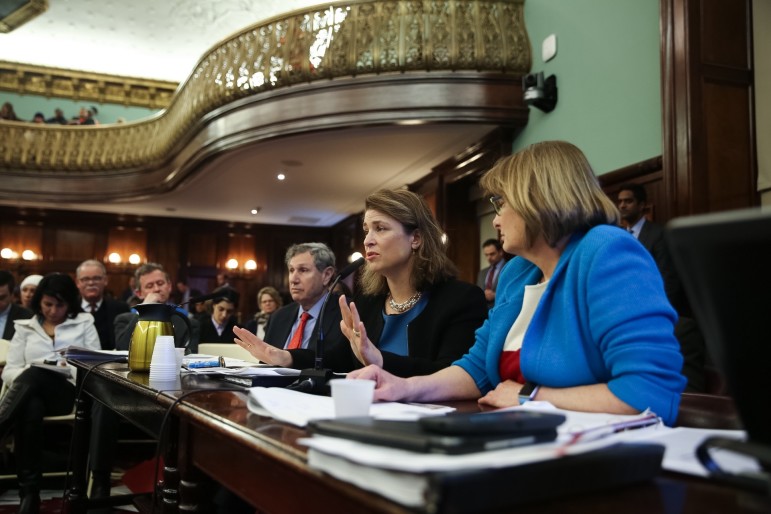
William Alatriste
Deputy Mayor Alicia Glen, gesturing, flanked by Planning Commission Chairman Carl Weisbrod and HPD Commissioner Vickie Been at the MIH hearing.
Tuesday’s hearing about the mayor’s proposed Mandatory Inclusionary Housing zoning policy, which would impose affordable housing requirements on new buildings in any neighborhood that gets upzoned, has been going on for more than seven hours at press time. And it’s just the first act: The hearing on Mayor de Blasio’s other citywide policy proposal, Zoning for Quality and Affordability, takes place Wednesday.
The wide-ranging and at times passionate discussion covered a lot of ground, but the main points of contention between supporters of the current proposal and skeptics on the Council were:
1. The affordability levels are not low enough: The proposal primarily revolves around two options that would set aside 25 percent or 30 percent of housing, respectively, for households averaging 60 percent of Area Median Income (AMI) or 80 percent of AMI. Councilmembers wanted affordability at the 30 percent AMI level. The administration answered that such housing was possible because of the averaging mechanism, but that requiring housing at that level could threaten cost feasibility and invite a legal challenge.
2. The workforce option: The proposal also includes a third option for housing at higher income levels as long as its provided without subsidies. The administration argued this was necessary to provide housing for “nurse and postal worker” and “cop and secretary” families, but councilmembers worried that it was a recipe for displacing lower-income people.
3. The hardship provision: If developers find the requirements onerous, they can apply for an exemption. The administration argued that this was a strict provision offering only limited relief, but some on the Council worried that it would be abused.
4. Locating affordable housing at a different site from market-rate housing: Councilmembers raised concerns that physically separating market-rate and affordable housing would lead to economic segregation. The administration said a rule requiring affordable housing to be opened for use before market-rate housing is activated would discourage builders from going offsite for the affordable. Some skeptics said they’d push to introduce steeper affordability requirements if an off-site development is involved.
5. The interplay between MIH and other subsidies: The administration is confident that some replacement for 421-a will be created and that other subsidy programs can pick up much of the slack. That addressed one concern of some Councilmembers. Another worry was that future mayors could end the separate subsidy programs that the de Blasio administration has designed to serve the lower-income households not helped by MIH.
6. Community board concerns: Councilmembers questioned whether the concerns of community boards and borough presidents, who almost unanimously objected to all or part of the proposal, were incorporated.
7. Lack of labor, safety and infrastructure requirements: Different councilmembers wondered why prevailing wages, minority and women hiring, construction safety and the provision of adequate infrastructure to support new residences were not addressed in the proposal. The administration’s response was that such topics were not appropriately addressed by a zoning text change.
8. Manufacturing zones: A few councilmembers said they were worried about manufacturing land being lost to housing, threatening industrial jobs. The administration argued that, to date, few manufacturing areas were being targeted for upzoning.
9. Impact on councilmembers’ negotiating ability: At least two councilmembers asked what impact the MIH policy would have on their ability to negotiate deals with developers looking to get permission to build projects in their neighborhoods. Administration officials continually insisted that MIH was a floor, not a ceiling.
10. Local preferences: Some councilmembers wanted bigger guarantees that local residents would have first shot at apartments in the new buildings created under MIH, but administration officials said that legal challenges to community preferences made any deeper commitment impractical.
Virtually to a person, councilmembers said they supported MIH … in concept. But it was clear that there would be tweaks, maybe big ones, as Council review continues. “MIH will certainly change,” said Land-Use chairman David Greenfield, a point echoed later by Speaker Melissa Mark-Viverito.








